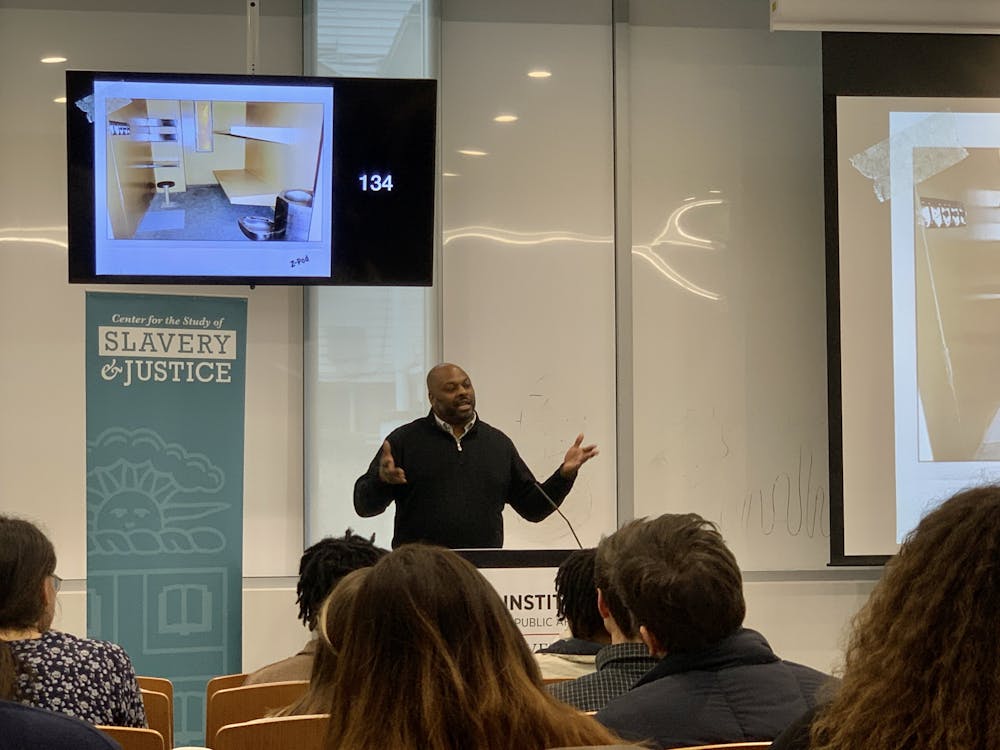Michael Walker, a sociologist and associate professor at the University of Minnesota at Twin Cities, discussed his research on incarceration, his book “Indefinite” and his experiences as an incarcerated person at a talk in Stephen Robert ’62 Hall Wednesday. The event, sponsored by the Center for the Study of Slavery and Justice, began with a presentation from Walker, transitioned into a conversation with Nicole Gonzalez Van Cleve, associate professor of sociology, and concluded with an audience Q&A.
The event was hosted as part of the CSSJ’s Mass Incarceration and Punishment in America research cluster, which allows students to “examine punishment and the U.S. carceral state through an interdisciplinary lens,” according to the CSSJ.
“Indefinite,” published in February 2022, is based on Walker’s experiences in the carceral system, which spanned his time in jail during pre-trial detention and the roughly four months he ultimately served. The book studies Walker’s own experiences and emotions in the California jail system, as well as the relationship between jail residents and the institution through conversations with Walker’s cellmates and correctional officers.
Though most people in jail haven’t been tried yet, everyone in it is “stripped of their identity,” dehumanized and treated as a criminal, Walker said. “Innocent until proven guilty but punished just the same.”
Walker’s presentation was well received by audience members, including community members and students from Gonzalez Van Cleve’s course SOC 1116: “Criminal Courts and the Law in an Era of Mass Incarceration.”
“It was very interesting seeing the book come to light through the talk,” said Sterling Stiger ’23.
“I liked hearing the justifications behind why he wrote the way he did,” said Alex Dufort ’24. “Being able to actually hear those answers just gave the book a different level of depth.”
Walker was arrested in his second year of graduate school while pursuing a PhD in sociology and was tried in criminal court. “It is one of the most debilitating experiences that you can have,” he told the audience. “You understand that your life is in the balance.”
Walker accepted a plea deal for a 180-day sentence, which was ultimately reduced to 134 days. Those 134 days are the subject of “Indefinite.”
“Walker is a sociologist by trade, and one of the rarest things about his work is that he could see inside of a jail, a place where so many people can't even get access,” Gonzalez Van Cleve told The Herald after the event.
“Incarceration really shields those who are on the outside of the jail from ever seeing the abuse and violence that happens inside the jail,” she added. “Walker was able to translate this life-changing experience into something that is educational for us all.”
In “Indefinite,” Walker approached his study from three lenses: as a sociologist discussing his research, a narrator explaining what happened and an individual describing his emotions.
Walker “writes in a very unique way for sociologists,” said attendee Gabreélla Friday, a postdoctoral fellow in international and public affairs who researches women’s experience in jails. “He includes a lot of affect with a lot of emotional clarity, as well as descriptive clarity of what's going on in his mind throughout this process.”
“Emotions really are key. It's how I understand the world,” Walker told audience members. He emphasized that he intended for the reader to feel the emotions of all the people he encountered while incarcerated. “You should feel angry because a lot of us do. You should feel happy because sometimes we were happy. You should feel what it's like.”
Walker also discussed the objectification of jail residents. “In the process of being assigned a number, being given a wristband that's put on tight enough that you can't really get it off, wearing just the county oranges, the uniform starts to speak for you. And it says ‘guilty,’” Walker said.
In his presentation, Walker focused on his study of sleep hygiene and the sociology of dreams among incarcerated people. While in jail, Walker recalled having “visceral, violent and scary” nightmares, and later found that other incarcerated individuals were having similar dreams, suggesting that their shared experience was somehow shaping their subconscious.
Walker also described a lack of sleep hygiene in jails, a shortcoming that he noted is often overlooked in the jail experience. He found that there was little access to natural sunlight, no regular recreational time and drastic changes in his circadian rhythm. “You could conceivably go months without ever seeing the sun,” he said.
“Indefinite” also explores the role of race in jail culture and hierarchy. According to Gonzalez Van Cleve, Walker describes “race and racism as a social engine that makes” carceral systems work.
Gonzalez Van Cleve said she hopes this event will “inspire current Brown students to do great things in the future that will hopefully change the systems that we have.”

Katie Jain is a University News editor from New Jersey overseeing the graduate student life beat. She is a senior concentrating in International and Public Affairs and History.





